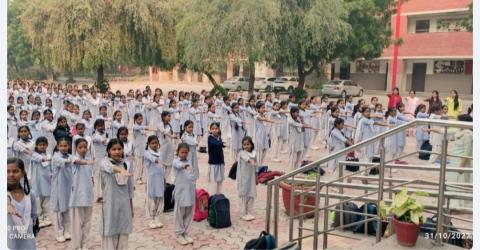
Rethinking School: Safe Spaces and Equal Opportunities for Every Child
The government schools, where most children come from disadvantaged backgrounds, often appear to be the only institutions in their lives that promise transformation and social mobility.
Teachers are perhaps the only individuals who tell them stories of an alternate world. Through teachers, they learn that there is a parallel world where individuals live with and exercise their rights. School provides them with a safe space where they can walk without fear of being struck by a vehicle or molested by a passerby. It’s a place where they have access to clean drinking water, a small meal, and toilet facilities with running water.
What troubles me most is when a child is deprived and held back as early as grade 5. We must come together to argue for the legitimate space of children in schools if we want a safe environment for their social and emotional growth.
What deprives them of this space? Our narrow conception of learning. Many teachers believe that children who don’t meet the set standards must be retained. The government, in scrapping the no-detention policy, used this pretext, claiming it was a demand from teachers. Learning is complex and cannot be simplified to fit rigid standards. How can we expect 10-year-old children to take full responsibility for their learning? It’s ironic: the same state that protects children under the Juvenile Justice Act, doesn't allow children below 18 to drive and penalizes those under 21 for marriage. Yet, it expects 10-year-olds to bear the responsibility for their learning and, if they fail, to repeat the same class.
The education system is designed for children; children are not designed for the education system. If the system finds that some children cannot perform within its confines, it is the system that needs to reflect, not the children who cannot be held accountable for the state's inability to design an appropriate system. It’s akin to victim-blaming and goes against all principles of justice. The education system in India, developed during the colonial period, was not designed to offer equal learning opportunities for all; rather, it was intended to create a select few who could serve the colonial administration. Unfortunately, we continue with the same system, and we have not freed ourselves from the colonial approach even in independent India.
The important components of the education curriculum, syllabus, and assessment are designed with middle or upper-middle-class children in mind, leaving a vast number of children out of this narrow scope. The system of evaluating children as pass or fail is irrelevant when we have entrance exams for admission to higher education and numerous assessments for job candidates. Both the job market and higher education are not linked to how children perform in school, so why are we punishing our children? The right to education is not enough; we need the right to schooling for every child up to the age of 18.
We need to stop viewing school solely as a place for academic learning. Schools must be reimagined as vital institutions that provide a safe space for children to grow socially and emotionally. Here, I differ from Illich’s argument for deschooling. His context was different; his arguments for an authentic educational setting are ideal but perhaps not suitable for the conditions we live in. We need a robust school system that guarantees not only education but also a childhood. If we protect the childhood of children, they will take care of their learning.
This year, we retained 262 children in grade 5 out of 28,126 students (around 0.93%). All of us raising young kids know what this means. It’s perhaps the biggest heartbreak for the parents and a shocking experience for the children, which may take years for them to recover from, if they survive in the system.
We are civilized people who care for tender ages, but once children reach grade 8, we drop all forms of consideration. A whopping 46,662 of the 2.34 lakh students who appeared for their grade 8 exams have been detained. This is approximately 20 percent, and in grade 9, this reaches up to 36 percent, and I don’t dare to spell out the exact number; let it be less painful. Percentages hide the actual numbers. When all research suggests that detention has no positive relation to learning, why are we so insistent on forcing children to repeat?
Why are we in such a hurry to declare a child a failure? In a recent interview, two well-celebrated Indian teachers, Vikas Divyakirti and H.C. Verma, shared that they picked up their studies very late. Vikas shared that people who knew him could guess anything about him except that he would study seriously. H.C. Verma shared that it was the grace marks that helped him reach grade 10. Our children deserve a longer stay in school. Schools are not just spaces for classroom learning; the other learning opportunities that lie outside our purview of assessment are equally important and often add more value to life.
- Log in to post comments
